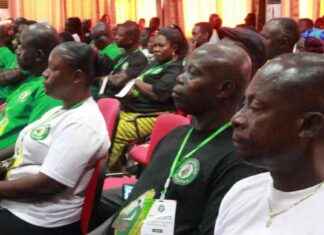Yiddish prayers chanted with closed eyes and a crowd dressed in black: tens of thousands of ultra-Orthodox Jews converge every year in ever larger numbers on the tomb of a famous thaumaturge rabbi, in northern Hungary.
“They say that anyone who comes here will have a blessed life,” says Tobi Ash, 57, met by AFP in Bodrogkeresztur, a village of 800 souls nestled in the heart of the Tokay vineyards.
This great-great-granddaughter of Rabbi Yéchaya Steiner, who died in April 1925 after having devoted his life to the poor, paid tribute to him for three days.
In this region, the cradle of Hasidism – one of the major currents of Jewish orthodoxy – this master was considered a “miracle worker”. He received in his home a crowd of faithful believers in his powers of healer of children or savior of marriages. A tradition taken up by his descendants about fifteen years ago.
Like Tobi Ash, the pilgrims came from all over the diaspora, by charter flights, buses or even helicopters for the VIPs.
“People feel that my grandfather listens to them and they reconnect with their roots” by asking him to give them health or to marry their children, explains his cousin Menachem Mendel Rubin, 38, who regularly travels from New York.
Bodrogkeresztur, located 220 kilometers northeast of Budapest, was once home to a large Ashkenazi community. But 750 of them were deported to Nazi death camps during World War II and almost none returned.
Born in the town, Israel Grosz survived the Holocaust before emigrating to the United States. The 92-year-old man with a white beard and a big smile is Rabbi Steiner’s oldest living relative.
“They call me every day to find out if I inherited my grandfather’s powers,” he laughs.
The communist parenthesis closed after 1989, the family bought the ancestral house and began to welcome believers. “Now we are rebuilding the synagogue,” Menachem Mendel Rubin said proudly, wearing a long gabardine and curls rolled up at his temples.
Women, less numerous, and men are strictly separated. A parchment scroll of the Torah, the holy text, is never far away, ready to be read in Hebrew by the faithful. Under the large white tent erected, unleavened bread pancakes are cooked, dishes in kosher meat sauce and “rugelach”, chocolate croissants.
Rabbi Steiner helped Jews and non-Jews alike, and villager Laszlo Bozso, 87, remembers his grandmother coming to him for family planning advice.
“That’s why I’m here, it’s a bit of a miracle,” he says, sitting on a bench watching the crowd of newcomers.
In the Jewish cemetery, located on the hill overlooking the village, Sean Casper, a 55-year-old Londoner, “prayed for everyone” who flagged himself on Facebook.
On the stone mausoleum, thousands of letters bearing the names of pilgrims and their relatives who could not move are piled up.
According to the organizers, around 50,000 participants have been registered this year, whereas there were only a few thousand at the start of the adventure. A number set to double, or even triple, on the occasion of the centenary of the rabbi’s death in 2025.
For some residents, it’s a “culture shock”, comments Mayor Istvan Rozgonyi, especially since this time the police preferred to cordon off the premises in order to avoid traffic jams caused by chartered buses.
Sign of the effervescence: the houses quickly find takers and many are those who benefit economically from the economic fallout.
This is the case of Tamas Kurucz, 34, who sells magnets bearing the image of the rabbi. “I like this festive atmosphere,” he says between two customers looking for a souvenir to put on the fridge door.
25/04/2023 18:15:45 – Bodrogkeresztur (Hongrie) (AFP) – © 2023 AFP






